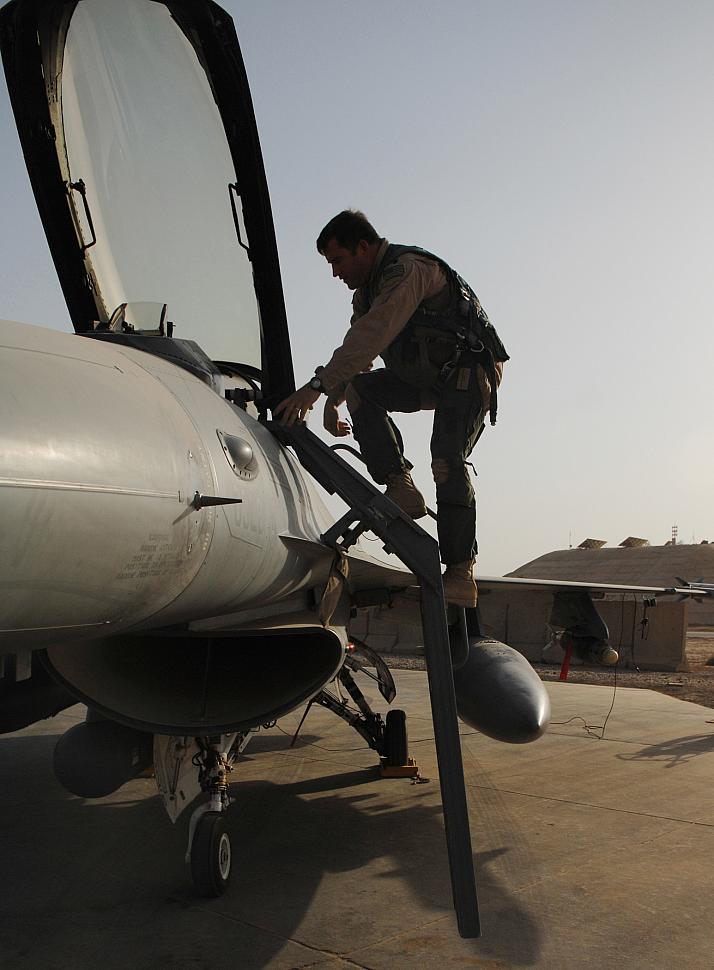Fighter Jet News
F-16 Fighting Falcon News
Tuskegee ANG unit joins 332nd AEW
August 18, 2009 (by
SrA Andria J. Allmond) -
Twenty-four members of the Alabama Air National Guard's 100th Fighter Squadron joined the 332nd Air Expeditionary Wing's operations group last month.

"Due to our high-speed training at home station, we were abundantly prepared for this deployment," said Lt. Col. Scott Patten, 100th FS commander. "We recently completed a Green Flag West [close air support and precision-guided munitions delivery] exercise at Nellis Air Force Base, and spin-up training at the Fort Irwin (Calif.) range, giving our pilots some real-world experience. Also, we have trained with servicemembers from Fort Benning (Ga.) and Ft. Bragg (N.C.), some of whom are currently deployed to JBB."
Originally named the 160th Fighter Squadron, the unit deactivated in 2007 in order to immediately reactivate as the 100th Fighter Squadron, a Tuskegee Airmen unit that fought in World War II.
According to the protocol of transferring legacy, the honors bestowed upon a unit are attached to its name. Therefore, when a unit takes on the name of a deactivated unit, they also acquire its history. This deployment marks the first time the relabeled 100th Fighter Squadron will serve under the 332nd Expeditionary Airlift Wing, a descendant of the original World War II Tuskegee unit, the 332nd Fighter Group.
"The 100th FS is proud to be the first Tuskegee Airmen squadron to be assigned to a Tuskegee Airmen group during this conflict," said Capt. Rich 'Sheriff' Peace, 100th FS F-16 pilot. "We look at this as a homecoming. We are also the first Tuskegee fighter squadron to fly and fight in a combat zone since World War II."
While this is the first time in Iraq for the 100th FS, the unit was stationed at JBB in 2006 under its previous nomenclature.
"We have deployed in support of Operation Iraqi Freedom in 2003, 2004 and in 2006 prior to us arriving back in-theater as the 100th FS. So, we have a lot of deployment experience with this group. Most of these guys have been deployed six to eight times."
Like the historical squadron whose name and emblem they bear, the 100th FS pilots are flying in support and protection of their own.
"Day in and day out, we are taking off and supporting the group form the air, providing close air support for the Air Force, Army and Marine troops here in Iraq." said Colonel Patten. "While the original Tuskegee Airmen escorted their guys in the air to protect them, we support our guys who are on the ground. If they get in trouble, we're going to be there to protect them."

Lt. Col. Mitch Von Hoffman, Director of Operations of the 100th FS, makes his way into the cockpit of F-16C block 30 #86-0326 from the 100th FS after a pre-flight inspection on August 12th, 2009. The 100th FS is based out of Montgomery and is slated to become an active-duty associate squadron. [USAF photo by SrA. Christopher Hubenthal]
Originally named the 160th Fighter Squadron, the unit deactivated in 2007 in order to immediately reactivate as the 100th Fighter Squadron, a Tuskegee Airmen unit that fought in World War II.
According to the protocol of transferring legacy, the honors bestowed upon a unit are attached to its name. Therefore, when a unit takes on the name of a deactivated unit, they also acquire its history. This deployment marks the first time the relabeled 100th Fighter Squadron will serve under the 332nd Expeditionary Airlift Wing, a descendant of the original World War II Tuskegee unit, the 332nd Fighter Group.
"The 100th FS is proud to be the first Tuskegee Airmen squadron to be assigned to a Tuskegee Airmen group during this conflict," said Capt. Rich 'Sheriff' Peace, 100th FS F-16 pilot. "We look at this as a homecoming. We are also the first Tuskegee fighter squadron to fly and fight in a combat zone since World War II."
While this is the first time in Iraq for the 100th FS, the unit was stationed at JBB in 2006 under its previous nomenclature.
"We have deployed in support of Operation Iraqi Freedom in 2003, 2004 and in 2006 prior to us arriving back in-theater as the 100th FS. So, we have a lot of deployment experience with this group. Most of these guys have been deployed six to eight times."
Like the historical squadron whose name and emblem they bear, the 100th FS pilots are flying in support and protection of their own.
"Day in and day out, we are taking off and supporting the group form the air, providing close air support for the Air Force, Army and Marine troops here in Iraq." said Colonel Patten. "While the original Tuskegee Airmen escorted their guys in the air to protect them, we support our guys who are on the ground. If they get in trouble, we're going to be there to protect them."
Courtesy of 332nd Air Expeditionary Wing Public Affairs
Related articles:
Forum discussion:
Tags
Forum discussion:
- Start a discussion about this article in the F-16.net forum.
Tags
